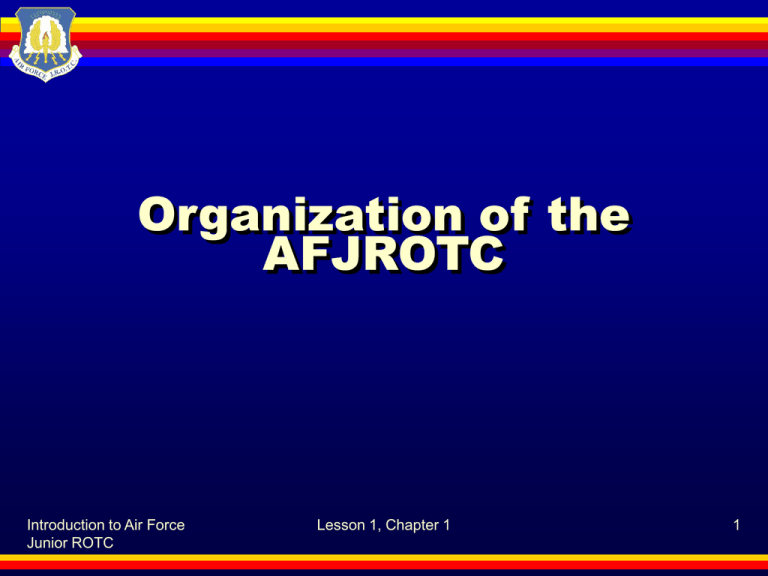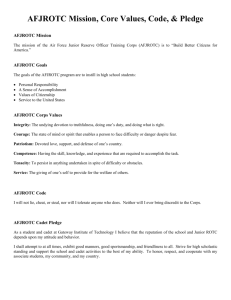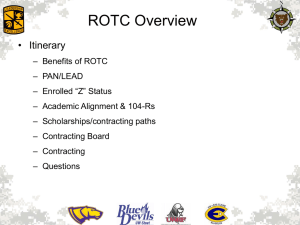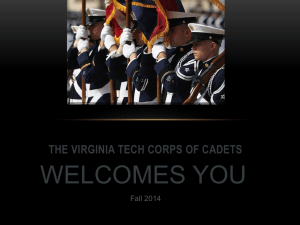Organization of the AFJROTC
advertisement

Organization of the AFJROTC Introduction to Air Force Junior ROTC Lesson 1, Chapter 1 1 Chapter overview • • Organization of the AFJROTC • What is the history of the Air Force Junior ROTC? • What is the chain of command and organization? The military uniform and appearance standards • What is the history of the uniform? • How should the uniform be worn? • What do the United States Air Force and Air Force Junior ROTC insignia represent? Introduction to Air Force Junior ROTC Lesson 1, Chapter 1, Organization of the AFJROTC 2 Chapter overview (cont’d) • Customs and courtesies for Air Force Junior ROTC • What customs and courtesies are expected of Air Force personnel? • How do Air Force personnel and Junior ROTC cadets show respect? • What behaviors are taboo in the Air Force Junior ROTC? • What is the difference between dining-in and dining-out? • What is the Military Ball? Introduction to Air Force Junior ROTC Lesson 1, Chapter 1, Organization of the AFJROTC 3 Chapter overview (cont’d) • Attitude, discipline, and respect • What is the role of attitude in the Air Force Junior ROTC? • What is the role of discipline in the Air Force Junior ROTC? • Ethics • What are the basic principles of ethics? • What are the United States Air Force Core Values? • What are ethical traits? • What are moral courage and maturity? • What is a personal code of conduct? Introduction to Air Force Junior ROTC Lesson 1, Chapter 1, Organization of the AFJROTC 4 Motivation • As an Air Force Junior ROTC cadet, you are a member of a strong organization. • Today, you’ll learn about your role in the AFJROTC. Introduction to Air Force Junior ROTC Lesson 1, Chapter 1, Organization of the AFJROTC 5 Lesson overview • • • • • What is the history of the Air Force Junior ROTC? What do cadets learn and do? What is the chain of command? How is the cadet corps organized? What is the cadet appointment and rotation system? Introduction to Air Force Junior ROTC Lesson 1, Chapter 1, Organization of the AFJROTC 6 Quick Write Jot down two activities that involve several people working together. How does knowing who will do what make the work go smoothly? Introduction to Air Force Junior ROTC Lesson 1, Chapter 1, Organization of the AFJROTC 7 What is the history of the AFJROTC? • 1820: American Literary, Scientific and Military Academy founded • 1911: First Junior ROTC program organized • 1916: National Defense Act passed • 1964: Public Law 88-647 directs military to establish Junior ROTC programs • 1973: Public Law 93-165 allows females to be counted toward Junior ROTC enrollment Introduction to Air Force Junior ROTC Lesson 1, Chapter 1, Organization of the AFJROTC 8 What is the history of the AFJROTC? (cont’d) • AFJROTC program requirements • Three-year military course • Enrollment of 100 or 10 percent of students • Students who are U.S. citizens • Students in ninth grade or higher • Fair distribution of programs nationally Introduction to Air Force Junior ROTC Lesson 1, Chapter 1, Organization of the AFJROTC 9 What is the history of the AFJROTC? (cont’d) • AFJROTC in 1966: 20 units • AFJROTC in 2005: over 740 units (more than 104,000 cadets) • Female cadets in 1972: 2,170 (9 percent) • Female cadets in 2005: 45,300 (more than 43 percent) Introduction to Air Force Junior ROTC Lesson 1, Chapter 1, Organization of the AFJROTC 10 What is the history of the AFJROTC? (cont’d) • Mission: To build better citizens for America • Goals: To instill • The value of citizenship • Service to the United States • Personal responsibility • A sense of accomplishment Introduction to Air Force Junior ROTC Lesson 1, Chapter 1, Organization of the AFJROTC 11 What is the history of the AFJROTC? (cont’d) • Objectives • Educate cadets in citizenship • Promote community service • Instill responsibility, character, and self-discipline • Provide instruction in the fundamentals of air and space science Introduction to Air Force Junior ROTC Lesson 1, Chapter 1, Organization of the AFJROTC 12 What do cadets learn and do? • Topics of study • Aerospace science courses • Military studies • Personal behavior, responsibility, and wellness • Citizenship • Effective communication skills • Management theories Introduction to Air Force Junior ROTC Lesson 1, Chapter 1, Organization of the AFJROTC 13 What do cadets learn and do? (cont’d) • Activities • Dances and military balls • Fund-raising • Athletics • Color guards • Drill teams Introduction to Air Force Junior ROTC Lesson 1, Chapter 1, Organization of the AFJROTC 14 What is the chain of command? • The chain of command is a line of responsibility from top to bottom. • The chain of command spells out relationships between and within sections. Introduction to Air Force Junior ROTC Lesson 1, Chapter 1, Organization of the AFJROTC 15 What is the chain of command? (cont’d) • Job descriptions explain every duty. • AFJROTC job descriptions and organization charts are based on those of the U.S. Air Force. Introduction to Air Force Junior ROTC Lesson 1, Chapter 1, Organization of the AFJROTC 16 What is the chain of command? (cont’d) • Steps for organizing an operation • Identify skills needed • Set up a working structure • Assign available resources within the structure Introduction to Air Force Junior ROTC Lesson 1, Chapter 1, Organization of the AFJROTC 17 How is the cadet corps organized? • Organization of the cadet corps • Wings (two or more groups) • Groups (two or more squadrons) • Squadrons (two or more flights) • Flights (two or more elements) • Elements (three or more cadets, including the element leader) Introduction to Air Force Junior ROTC Lesson 1, Chapter 1, Organization of the AFJROTC 18 How is the cadet corps organized? (cont’d) • Organizational chart for a typical cadet wing Introduction to Air Force Junior ROTC Lesson 1, Chapter 1, Organization of the AFJROTC 19 How is the cadet corps organized? (cont’d) • Organizational chart for a typical cadet group Introduction to Air Force Junior ROTC Lesson 1, Chapter 1, Organization of the AFJROTC 20 How is the cadet corps organized? (cont’d) • SASI—Senior Aerospace Science Instructor • The SASI • Is responsible for the function and management of the unit • Selects commanders and staff Introduction to Air Force Junior ROTC Lesson 1, Chapter 1, Organization of the AFJROTC 21 How is the cadet corps organized? (cont’d) • Cadets in staff positions help run the corps. • Air Force Junior ROTC positions closely mirror U. S. Air Force staff structure. Introduction to Air Force Junior ROTC Lesson 1, Chapter 1, Organization of the AFJROTC 22 How is the cadet corps organized? (cont’d) • The cadet organizational structure must • Reflect actual functions • Be consistent with military organizational principles • Meet provisions of Air Force Organization Introduction to Air Force Junior ROTC Lesson 1, Chapter 1, Organization of the AFJROTC 23 What is the cadet appointment and rotation system? • The SASI selects the cadet corps commander, subordinate commanders, and staff members. • The SASI may adopt Promotions for Exceptional Performers (PEP). Introduction to Air Force Junior ROTC Lesson 1, Chapter 1, Organization of the AFJROTC 24 What is the cadet appointment and rotation system? (cont’d) • The SASI maintains a written policy on the appointment and rotation system. • Cadet grades are not to be confused with U.S. Air Force grades. Introduction to Air Force Junior ROTC Lesson 1, Chapter 1, Organization of the AFJROTC 25 What is the cadet appointment and rotation system? (cont’d) • Permanent cadet grades for each year • First year: Cadet airman • Second year: Cadet airman first class • Third year: Cadet senior airman • Fourth year: Cadet staff sergeant Introduction to Air Force Junior ROTC Lesson 1, Chapter 1, Organization of the AFJROTC 26 Lesson review • The first technical and military school in the United States was the American Literary, Scientific, and Military Academy, which was founded in 1820. • The earliest ROTC program was organized in 1911 by Army Lieutenant Edgar R. Steevers. Introduction to Air Force Junior ROTC Lesson 1, Chapter 1, Organization of the AFJROTC 27 Lesson review (cont’d) • In 1964, Public Law 88-647 directed military branches to establish Junior ROTC units. • In 1973, Public Law 93-165 allowed females to count toward Junior ROTC enrollment. • As of 2005, there are over 740 Air Force Junior ROTC units and more than 104,000 cadets. Introduction to Air Force Junior ROTC Lesson 1, Chapter 1, Organization of the AFJROTC 28 Lesson review (cont’d) • Cadets learn about aerospace, the military, personal improvement, citizenship, and management. • Cadets may attend dances and military balls, raise funds, and participate in athletics, color guards, and drill teams. Introduction to Air Force Junior ROTC Lesson 1, Chapter 1, Organization of the AFJROTC 29 Lesson review (cont’d) • The chain of command is a line of responsibility from top to bottom. • The chain of command spells out relationships between and within sections. • The cadet corps is organized into wings, groups, squadrons, flights, and elements. Introduction to Air Force Junior ROTC Lesson 1, Chapter 1, Organization of the AFJROTC 30 Lesson review (cont’d) • The SASI selects the cadet corps commander, subordinate commanders, and staff members. • Permanent grades are based on the number of years in AFJROTC. • The SASI may promote outstanding cadets to higher positions or grades. Introduction to Air Force Junior ROTC Lesson 1, Chapter 1, Organization of the AFJROTC 31 Summary • What is the history of the Air Force Junior ROTC? • What do cadets learn and do? • What is the chain of command? • How is the cadet corps organized? • What is the cadet appointment and rotation system? Introduction to Air Force Junior ROTC Lesson 1, Chapter 1, Organization of the AFJROTC 32 Next Done— The Air Force Junior ROTC history and structure Next— The Air Force Junior ROTC uniform and how to wear it Introduction to Air Force Junior ROTC Lesson 1, Chapter 1, Organization of the AFJROTC 33





